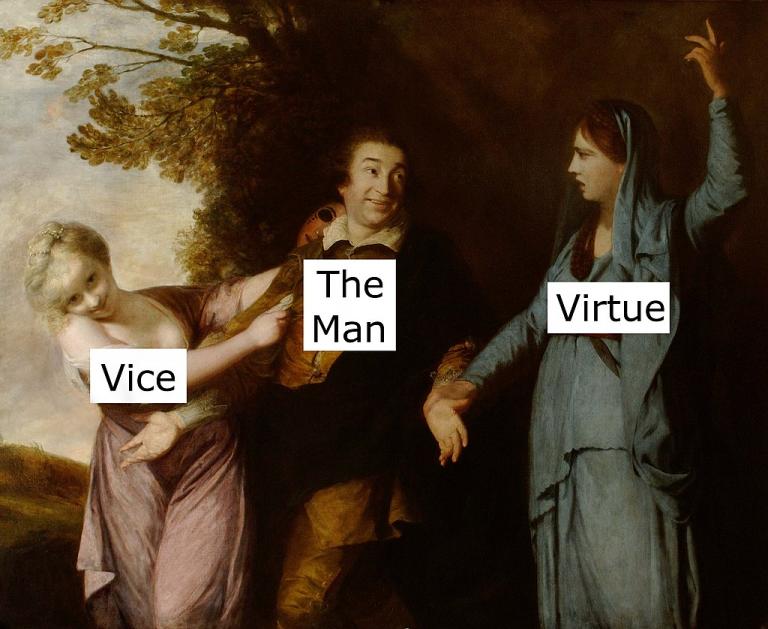A “value” is something that someone treasures or considers to be important. “Virtue” comes from a word meaning strength or power.
A moral value refers to an ethical principle that we especially desire or appreciate. A moral virtue refers to the strength of character or the power to follow an ethical principle.
There are also other kinds of virtue, including for intellectual attainments and for sports.
Louis Markos, a humanities professor at Houston Baptist University, has published a new book entitled The Myth Made Fact: Reading Greek and Roman Mythology through Christian Eyes [paid link]. The Federalist has printed an excerpt with the title How to Stop Schools from Replacing True Virtue with Leftist Virtue Signaling.
Markos says that he used to believe that the problem in American education is that schools have stopped teaching virtue. But he has come to realize that that schools are teaching moral principles; namely, what he calls the “five pseudo-virtues” of tolerance, inclusivism, egalitarianism, multiculturalism, and environmentalism.
These are not necessarily bad in themselves, but they are actually not so much virtues as values. “These five virtues — which I will henceforth call values since they are man-made and culture-bound rather than eternal and cross-cultural — have never stood at the center of morality.”
Markos, who has also written on this subject in his book On the Shoulders of Hobbits: The Road to Virtue with Tolkien and Lewis, contrasts these relatively passive and subjective values with the Seven Virtues of classical and Christian thought: “These seven are composed of the four classical (or cardinal) virtues of courage (fortitude), self-control (temperance), wisdom (prudence), and justice, and the three Christian (or theological) virtues of faith, hope, and love (charity).”
I would add that the “cardinal virtues”–also called the natural virtues–were thought by Christian thinkers to be within the capacity of all human beings, including the pagans, who exalted them highly. Though we speak of them as moral principles themselves, they are also what is required to obey the moral principles, such as we have in the Ten Commandments. Cultivating the virtue of self-control can help us refrain from committing adultery, giving vent to our anger by killing, and surrendering to our passion for our neighbor’s property by stealing. A sense of justice can help us to honor our parents and to not commit false witness. Courage enables us to defy peer pressure and physical dangers to do what is right. Thus, the virtues have to do not with meriting salvation but with learning the external First Use of the Law in education and character formation.
The “theological virtues”–also called the spiritual virtues–cannot be found among the pagans but are intrinsically Christian: faith, hope, and love. (You will hardly find them in pagan authors.) They are virtues on a profound level because they actually empower us to follow, at least to some degree, God’s commands. Faith bears fruit in good works. Love motivates us not to kill, steal, or otherwise harm our neighbors, but rather to help them. The spiritual virtues grow out of the Gospel.
We would do well to recover this vocabulary and these concepts. Otherwise, we will just engage in controversy over subjective “values” that no one can resolve and never manage to achieve actual moral education, either in ourselves or in our children.
The Natural Virtues–courage, self-control, wisdom, and justice–are not religious, as such, though religion supports them. These can be taught in public schools. Learning to control oneself is a valuable lesson for anyone. Learning the principles of justice is essential for good citizenship and meaningful political engagement. Wisdom–which encompasses prudence, practicality, and thinking our actions through–is a survival skill. Courage is something we all admire and can be taught to emulate.
The key is to make these virtues appear to young people as attractive and admirable. This was traditionally the task of literature, of stories, with heroes we yearn to emulate, as Marcos demonstrates in his books. The task is to learn to value (subjectively) what is good (objectively).
These Natural Virtues will make our young people and our society more successful. But they will also make them aware of their failures to live up to their own ideals, even their own “values.”
At that point, the church can step in with the Gospel, which brings to life the Spiritual Virtues–faith, hope, and love–that bring forgiveness and inner transformation.
Image: The painting David Garrick Between Tragedy, with labels inspired by the print “L’Homme entre le Vice et la Vertu” from FallingGravity, CC0, via Wikimedia Commons














